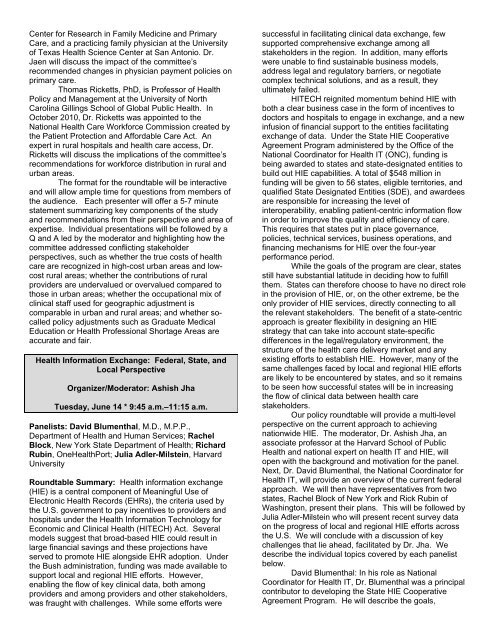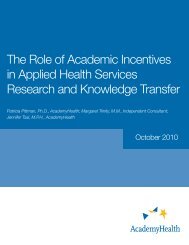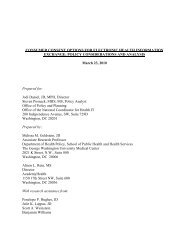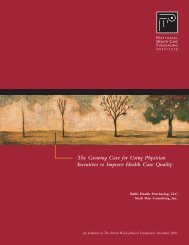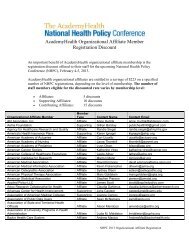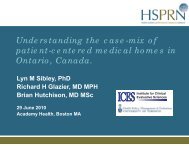Policy Roundtable Abstracts - AcademyHealth
Policy Roundtable Abstracts - AcademyHealth
Policy Roundtable Abstracts - AcademyHealth
You also want an ePaper? Increase the reach of your titles
YUMPU automatically turns print PDFs into web optimized ePapers that Google loves.
Center for Research in Family Medicine and Primary<br />
Care, and a practicing family physician at the University<br />
of Texas Health Science Center at San Antonio. Dr.<br />
Jaen will discuss the impact of the committee’s<br />
recommended changes in physician payment policies on<br />
primary care.<br />
Thomas Ricketts, PhD, is Professor of Health<br />
<strong>Policy</strong> and Management at the University of North<br />
Carolina Gillings School of Global Public Health. In<br />
October 2010, Dr. Ricketts was appointed to the<br />
National Health Care Workforce Commission created by<br />
the Patient Protection and Affordable Care Act. An<br />
expert in rural hospitals and health care access, Dr.<br />
Ricketts will discuss the implications of the committee’s<br />
recommendations for workforce distribution in rural and<br />
urban areas.<br />
The format for the roundtable will be interactive<br />
and will allow ample time for questions from members of<br />
the audience. Each presenter will offer a 5-7 minute<br />
statement summarizing key components of the study<br />
and recommendations from their perspective and area of<br />
expertise. Individual presentations will be followed by a<br />
Q and A led by the moderator and highlighting how the<br />
committee addressed conflicting stakeholder<br />
perspectives, such as whether the true costs of health<br />
care are recognized in high-cost urban areas and lowcost<br />
rural areas; whether the contributions of rural<br />
providers are undervalued or overvalued compared to<br />
those in urban areas; whether the occupational mix of<br />
clinical staff used for geographic adjustment is<br />
comparable in urban and rural areas; and whether socalled<br />
policy adjustments such as Graduate Medical<br />
Education or Health Professional Shortage Areas are<br />
accurate and fair.<br />
Health Information Exchange: Federal, State, and<br />
Local Perspective<br />
Organizer/Moderator: Ashish Jha<br />
Tuesday, June 14 * 9:45 a.m.–11:15 a.m.<br />
Panelists: David Blumenthal, M.D., M.P.P.,<br />
Department of Health and Human Services; Rachel<br />
Block, New York State Department of Health; Richard<br />
Rubin, OneHealthPort; Julia Adler-Milstein, Harvard<br />
University<br />
<strong>Roundtable</strong> Summary: Health information exchange<br />
(HIE) is a central component of Meaningful Use of<br />
Electronic Health Records (EHRs), the criteria used by<br />
the U.S. government to pay incentives to providers and<br />
hospitals under the Health Information Technology for<br />
Economic and Clinical Health (HITECH) Act. Several<br />
models suggest that broad-based HIE could result in<br />
large financial savings and these projections have<br />
served to promote HIE alongside EHR adoption. Under<br />
the Bush administration, funding was made available to<br />
support local and regional HIE efforts. However,<br />
enabling the flow of key clinical data, both among<br />
providers and among providers and other stakeholders,<br />
was fraught with challenges. While some efforts were<br />
successful in facilitating clinical data exchange, few<br />
supported comprehensive exchange among all<br />
stakeholders in the region. In addition, many efforts<br />
were unable to find sustainable business models,<br />
address legal and regulatory barriers, or negotiate<br />
complex technical solutions, and as a result, they<br />
ultimately failed.<br />
HITECH reignited momentum behind HIE with<br />
both a clear business case in the form of incentives to<br />
doctors and hospitals to engage in exchange, and a new<br />
infusion of financial support to the entities facilitating<br />
exchange of data. Under the State HIE Cooperative<br />
Agreement Program administered by the Office of the<br />
National Coordinator for Health IT (ONC), funding is<br />
being awarded to states and state-designated entities to<br />
build out HIE capabilities. A total of $548 million in<br />
funding will be given to 56 states, eligible territories, and<br />
qualified State Designated Entities (SDE), and awardees<br />
are responsible for increasing the level of<br />
interoperability, enabling patient-centric information flow<br />
in order to improve the quality and efficiency of care.<br />
This requires that states put in place governance,<br />
policies, technical services, business operations, and<br />
financing mechanisms for HIE over the four-year<br />
performance period.<br />
While the goals of the program are clear, states<br />
still have substantial latitude in deciding how to fulfill<br />
them. States can therefore choose to have no direct role<br />
in the provision of HIE, or, on the other extreme, be the<br />
only provider of HIE services, directly connecting to all<br />
the relevant stakeholders. The benefit of a state-centric<br />
approach is greater flexibility in designing an HIE<br />
strategy that can take into account state-specific<br />
differences in the legal/regulatory environment, the<br />
structure of the health care delivery market and any<br />
existing efforts to establish HIE. However, many of the<br />
same challenges faced by local and regional HIE efforts<br />
are likely to be encountered by states, and so it remains<br />
to be seen how successful states will be in increasing<br />
the flow of clinical data between health care<br />
stakeholders.<br />
Our policy roundtable will provide a multi-level<br />
perspective on the current approach to achieving<br />
nationwide HIE. The moderator, Dr. Ashish Jha, an<br />
associate professor at the Harvard School of Public<br />
Health and national expert on health IT and HIE, will<br />
open with the background and motivation for the panel.<br />
Next, Dr. David Blumenthal, the National Coordinator for<br />
Health IT, will provide an overview of the current federal<br />
approach. We will then have representatives from two<br />
states, Rachel Block of New York and Rick Rubin of<br />
Washington, present their plans. This will be followed by<br />
Julia Adler-Milstein who will present recent survey data<br />
on the progress of local and regional HIE efforts across<br />
the U.S. We will conclude with a discussion of key<br />
challenges that lie ahead, facilitated by Dr. Jha. We<br />
describe the individual topics covered by each panelist<br />
below.<br />
David Blumenthal: In his role as National<br />
Coordinator for Health IT, Dr. Blumenthal was a principal<br />
contributor to developing the State HIE Cooperative<br />
Agreement Program. He will describe the goals,


